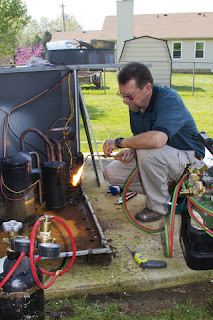Your air conditioner is an
expensive and complex piece of machinery and needs professional care and
service to keep it working properly and to extend its working life. Any
compromises here could increase the chances of major fault developing
and the resulting large repair bills. That being said, there are a few
simple actions you can take to keep your air conditioner clean and in
good condition. You don’t need to be an HVAC expert or have any special
tools to do this. A little common sense and a few basic tools that are
found in all homes are all that is required. Here are a few things that
you should do once a month during the season that the unit is being
used. The specific location of the components mentioned below will vary
depending on the type of air conditioner installed and the make. Your
user’s manual will have diagrams and details of where the components
are.
- Turn off the power: Before doing anything, always turn off the power to the unit by tripping the circuit breaker. This ensures that you are safe from the risk of electrical shocks.
- Clean the compressor: If the compressor is covered by a thick layer of dust and grime, it will run excessively hot and this will increase the chances of it failing. The compressor is one of the most expensive parts of the air conditioner and replacement will make a big hole in your pocket. Remove the dirt with a brush.
- Clean the condenser fan: The fan get dirty easily and besides the layers of dirt placing an extra load on the motor, the air circulation is also affected. Use a brush to remove the dirt.
- Lubricate the fan motor: If the fan is noisy or has developed a vibration, remove the fan from the motor by unscrewing it. The oil ports for the motor should be visible. Lubricate the motor using the oil given in the user’s manual in the specified quantities.
- Service the air filter: A dirty air filter will collect fungus and bacteria and circulate it. The airflow will also be restricted leading to loss of cooling and more load on the unit. Remove the filter every couple of weeks, and wipe it with a clean cloth. Then wash it with nonabrasive soap and water. Allow it to dry completely before reinstalling it.
- Clean the ducts: Use a vacuum cleaner to clean dust and debris from the ducts.
- Check the connections: Check the fuses, breakers and visible wiring regularly to catch loose connections and incipient short circuit issues before they become major ones.
These are all basic maintenance tasks. They can, at most, supplement the regular maintenance that should be done by an HVAC maintenance company. If you are in doubt on how to go about them, or feel that there is a specific problem that needs to be addressed, call an air conditioning expert to check the unit and attend to the problem. Remember that the best way to keep you air conditioner running well is to have it maintained by experts. Also keep in mind that if a unit that is not serviced regularly it may consume excess electricity and inflate your utility bills.







